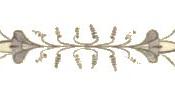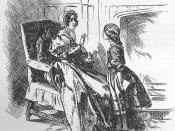Jane Eyre: The Epitome of Independence and Rebelliousness Abstract: During the 1800's, the time period in which women are stereotyped as being "submissive, dependent, beautiful, but ignorant" in British society, Jane Eyre, the Charlotte Bronte's heroine, stands out as an independent individual.
She struggles to resist the efforts of others to mold her to their own views of who she should be. Her loyal devotion to her own moral principles brings her a great deal of sufferings, but she survives a number of challenges to her personal beliefs. Jane Eyre preserves personal integrity in her search for a self-fulfilling happiness. Her self-respect, independence, courage, rebelliousness, outspokenness and honesty guide her in her journey to self-fulfillment. Such traits also shape her a splendid and eternal female image among literary works around the world for more than one hundred years. The article attempts to probe into Jane's complex characterization and moral vision reflected in her life at Gateshead, Lowood, Thornfield and Moors respectively.
At the same time, the article also analyses the relationship between Jane's rebelliousness and social oppression, stagnation and religious hypocrisy in the hope of helping readers to appreciate the theme of Jane Eyre on more profound perspective.
Key Words: independence rebelliousness integrityáá Introduction: As an orphan, Jane Eyre has no family or friends, no wealth or position, misunderstood and mistreated by the relatives she does have, she is sent away to a school where the cycle of cruelty continues. All alone in the world, she seems doomed to a life of failure. Mrs. Reed, Mr. Brocklehurst, St. John or even her loved Mr. Rochester try to "destroy her selfhood" and mold a character whom they think she should be. What's a girl to do? Does she stand passively by and accept her fate, as the common belief of the times would have it? Or does she stand up for her rights and fight for the life of success she deserves? Jane Eyre takes the latter route by stating " I am my own mistress!" Although this may have shocked readers of the time, Jane's actions would open the door for a new interpretation of women. Jane Eyre shows that it is possible for a woman in the nineteenth century to achieve independence and success on her own, no matter what odds are against her.





